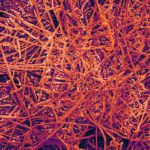Link to Pubmed [PMID] – 32209465
Cell Rep 2020 Mar;30(12):4016-4026.e4
Pathogenic bacteria can alter host gene expression through post-translational modifications of histones. We show that a natural colonizer, Streptococcus pneumoniae, induces specific histone modifications, including robust dephosphorylation of histone H3 on serine 10 (H3S10), during infection of respiratory epithelial cells. The bacterial pore-forming toxin pneumolysin (PLY), along with the pyruvate oxidase SpxB responsible for HO production, play important roles in the induction of this modification. The combined effects of PLY and HO trigger host signaling that culminates in H3S10 dephosphorylation, which is mediated by the host cell phosphatase PP1. Strikingly, S. pneumoniae infection induces dephosphorylation and subsequent activation of PP1 catalytic activity. Colonization of PP1 catalytically deficient cells results in impaired intracellular S. pneumoniae survival and infection. Interestingly, PP1 activation and H3S10 dephosphorylation are not restricted to S. pneumoniae and appear to be general epigenomic mechanisms favoring intracellular survival of pathogenic bacteria.





